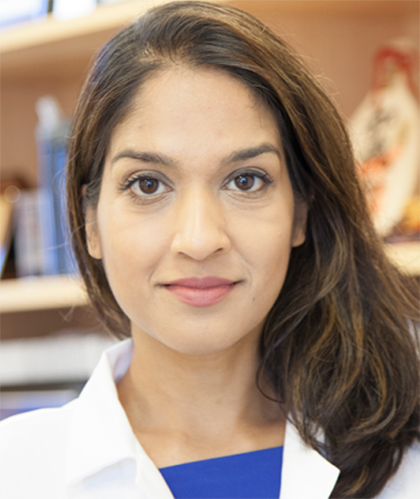NIMHD’s Pioneers in Minority Health and Health Disparities Q & A Campaign
As we celebrate the Asian American and Pacific Islander (AAPI) heritage month this year, we are recognizing pioneer researchers in minority health and health disparities field, whose career trajectories have been shaped by the NIMHD-sponsored Loan Repayment Program (LRP) and subsequent research program grants. Meet Sonali Bose, M.D., M.P.H.

Dr. Sonali Bose
Dr. Bose is an assistant professor of medicine, pulmonary, critical care and sleep medicine at the Icahn School of Medicine at Mount Sinai, New York City. She specializes in pulmonary medicine and sees patients with asthma at the Mount Sinai-National Jewish Respiratory Institute.
Dr. Bose is a second-generation South Asian immigrant and her family is from Eastern India. On her motivation to work on addressing health disparities in minority and vulnerable populations, she said, “my family has a long history of being active in advocacy and justice issues, especially coming from the family of Netaji Subhas Chandra Bose, a well-known freedom fighter during the Indian Independence Movement. Spending long stretches of my childhood in India, where poverty and illness are visible, also made an early impression on me. In the early 1980’s I moved to the New York City (NYC) metropolitan area from Canada. My school and community in NYC were almost exclusively composed of immigrant populations from around the world. Unfortunately, I witnessed racial conflict within my community. In the midst of this racial unrest, I saw something amazing: patients, regardless of their heritage or background, sought out my father, who was an internist at the time. It was evident to me that medicine was a language that bridged gaps across racial and ethnic disparities, and health was a universal currency. These experiences provide a constant motivation for me to connect my academic work back to promoting the wellbeing of vulnerable populations within my own neighborhood.”
Dr. Bose’s research focuses on the influence of prenatal air pollutant and stress exposures on sleep and respiratory outcomes in urban preschool-aged children. She investigates the roles of maternal and prenatal stress, environmental pollutants, and racial and ethnic factors that can lead to childhood sleep disparities and respiratory illnesses.
Q & A with Dr. Sonali Bose:
How your research is impacting public health?
My ongoing research examines the impact of environmental pollutants on child development and health. Significant health disparities exist in childhood prevalence of respiratory disorders, including asthma, allergies, and sleep disorders. We believe that many of these disparities originate from environmental exposures (e.g. air pollution) that occur very early in life, for example, in the prenatal period, during which programming of the respiratory system occurs in the fetus. My work focuses on examining the association between chemical and nonchemical pollutant exposures and childhood respiratory diseases, such as asthma and sleep disorders, in vulnerable populations.
How has the Loan Repayment Program (LRP) impacted your career?
The Loan Repayment Program was one of the first grants I received in my first year of pulmonary/critical care fellowship. It was instrumental in introducing me to the world of disparities research. It allowed me to appreciate the complexities of designing research studies to better understand the multiple factors that contribute to poor respiratory health in communities with the highest burden of asthma. I developed practical skills in conducting observational studies in minority populations, as well as in designing interventions to help close these gaps in health, through a K23 funding mechanism. Since the LRP award, I have received an R01 grant focused on child sleep disparities, which has allowed me to continue my clinical research to study the influence of environmental pollution within ethnically diverse populations.
What was your motivation in becoming an independent research investigator?
Becoming an independent research investigator was part of a natural evolution of the skills I acquired through the various stages of my training. However, my most significant motivation to reaching this stage has been--and continues to be—the incredible role models who have been my mentors over the years. In particular, several of my mentors have been inspirational women leaders who have taught me through example about how to lead independent research of my own, and how to keep finding joy while doing it.
Is there a particular challenge you had to overcome in your career, and what advice would you give to the next generation?
After being a fellow and junior faculty in Baltimore for almost 9 years, I moved back to New York to be with my family and relocate my professional life to a different institution; in essence “start over” in my research career. I had to navigate new infrastructure, learn new research tools, and form new collaborations, but it was important to be patient through these struggles. My advice would be that solid training in clinical research imparts fundamental skills that can be applied to any scientific question, even within unfamiliar topic areas, and that being open to new areas of research can be rewarding and growth-promoting in ways that you may not anticipate.
What is your vision for health equity in this new decade?
My vision for improved health equity starts with increasing awareness of the factors starting in very early life that perpetuate lifelong disparities in health among vulnerable populations. Children who are vulnerable to structural and environmental factors that tip the scale toward chronic diseases and unattained health potential must be identified early. I look forward to the development of more focused interventions to protect the health of our youngest as a way of promising the best chance of health equity in their future, both at the individual and community level.
Page updated Dec. 24, 2024

















